Text
30 llibres en català!
Bon any! (Sí, ja sé que arribo molt tard, però necessitava un descans després dels examens i tant de viatjar durant les vacances 😅) Porto un temps volent fer algun pas més amb el català, com que ja tinc un C1 còmode i no gaire pressió per millorar. El fet és que arribat en aquest punt, encara em queda moltíssim per aprendre, i per fer el pas al C2 i més enllà he d’esforçar-me més per afinar el lèxic i aprecisar els registres. També és cert que no he tingut gaires oportunitats aquest any per utilitzar el català, i es nota. Però tot això té un remei: tornar a estudiar, verament estudiar, el català.
Amb el C1 i C2, com que depenen tant de l’ús precís i mesurat de la llengua, és molt important interactuar amb una diversitat de gèneres i estils lingüístics. Amb el català, no tinc cap problema amb la gran majoria de registres orals ni escrits, si és que són informals, però entrats en coses més formals ja hi tinc molt menys familiaritat. També cal dir que el llenguatge literari sol ser més ric, tant a nivell lèxic com estilístic, i per això és un bon punt de partida per treballar la llengua. A més a més, llegir en anglès ja forma una gran part del meu dia-a-dia, i tot i que no puc canviar-ho tot al català, fer que el català sigui una de les llengües que faig servir tindrà un impacte important en el meu nivell i també podrà ser una part fonamental de la meva vida professional en algun moment, com que em vull dedicar a la catalanística. Per totes aquestes raons, crec que posar-me a prova amb la lectura en català serà un bon repte.
He pres com a punt de partida aquest repte en castellà (que he arribat a conèixer gràcies a, i que també ha estat elaborat més per @cernuda), però he decidit rebaixar la quantitat de llibres per algunes raons: (1) la persona que ha fet el repte ha triat llibres més curtets, i jo en tinc algunes de 500 pàgines i més, per tant crec que és més que justificat, (2) tinc moltes coses que em demanen l’atenció i sé que si poso un número més alt no em trobaré amb els ànims d’acabar el repte, (3) vull tenir el temps d’assaborir alguns d’aquests llibres perquè són clàssics, i (4) ja faig moltes més coses en català, i llegir 30 llibres ja per mi són molts llibres per llegir en un any, ni que siguin en català. Crec que, vist així, té tot el sentit del món la xifra que he triat.
Tinc una llista més o menys elaborada, amb una gran varietat de llibres (no-ficció, juvenil, medieval, poesia, tant moderns com clàssics de la llengua), i espero que amb això ja tindré prou per ocupar-me fins a desembre. Si teniu recomanacions ja em direu, i moltes gràcies a @no-passaran i @quimerathetraveler per l’allau de llibres que ja m’heu recomanat, sou els millors ❤️ Si algú més s’anima a acompanyar-me, ja em diràs i podem intercanviar llistes. I amb això, apa, a llegir!
#catalan:general#catalan:goals#general:goals#no prometo absolutament res de contingut perquè amb llegir ja n'hi ha prou però si ha un llibre que m'agrada en especial us ho diré#però vull llegir tirant lo blanc el canigó el llibre de meravelles i incerta glòria com a mínim#fa temps que els he volgut llegir però necessito una excusa per fer-ho#em sap greu quimera no m'ha deixat etiquetar-te 😔✊ però mil gràcies per totes les recomanacions ja confio que veuràs aquest post#ostres porto el català formal fatal però ja ho treballarem ja :///
24 notes
·
View notes
Text
Language Goals 2024
Another year, another set of goals! This year, in the actual spirit of my very reasonable 2022 language goals, here are my plans for language study.
Catalan
First and foremost, my goal is to find Catalan friends in my new hometown, because I really need to speak Catalan with people at minimum once a week or I get very sad, and currently I’m not speaking it with anyone at all. This goal is pretty chill though—I just have to actually sit down and put in the time to find people.
My main goal is to read 30 books in Catalan. I’ll make a proper post about it with a list of books that I’m thinking of and how the challenge itself is going to work, but overall I’m trying to pick a mix of styles and genres, so expect anything from medieval literature to YA novels to academic texts. I have a lot of books that I’ve been meaning to read for a while, so hopefully this will give me a chance to chip into some of them. 30 books is less than other versions of this challenge that I’ve seen, but it’s also many more books than I’ve read in Catalan possibly ever and I think it’s more reasonable in conjunction with a full class load. Hopefully it ends up being just the right amount!
Welsh & Basque
This year I really want to work hard to actually get these two to an upper intermediate level, because I’m so close if I put in the work. For both of them, I have two main goals: (1) go through the textbooks/workbooks that I started going through casually last semester (Basic Welsh: A Grammar and Workbook by Gareth King and Standard Basque: A Progressive Grammar by Rudolf P.G. de Rijk) so that I can continue to review and learn new grammatical structures, and (2) watch one episode of a TV series each week in each language. For the TV series, I’m going to be watching Rownd a Rownd on S4C (which is available outside Wales/the UK! Huge win!) and Eskamak kentzen on EITB. If I have time, I’ll try to go through episodes more thoroughly and note down new vocabulary and such, but the main goal is to make a routine of it and watch consistently so I’m trying to keep it simple. I’d also like to use both languages with other people more often if I can, but I think finding a consistent language partner will perhaps be a goal for another year.
Malayalam
I’m planning to focus the first half of the year on Welsh and Basque, and then next fall, I’m hoping to be able to take the Malayalam classes offered by my university and to get into studying my home dialect (or rather, my extended family’s home dialect, since I didn’t speak it at home) as well. Since this will be later and also classroom learning rather than self-study, I’m not going to go into details, but overall, after my trip to Kerala (which I have stuff about, it’s on the docket!), I’m generally feeling much less alienated and much more motivated to study the language. I’m also looking forward to being able to take real classes, which I think will help keep me focused and on track.
Russian
This is a minor goal, but at my friend’s house over the summer, her mom was joking that if they just spoke to me in Russian while I stayed at their house, I’d probably be able to understand it by the end. That led us to concoct a plan where I study a bit of Russian vocab, then go there and do intensive Russian immersion for a weekend or so. This is more of a silly goal, but I’d like to try it because I think it could be fun.
Anki
This isn’t a language goal per se, but rather a general resolution to spend this year learning to use (and tweaking and configuring) Anki. Anki has a notoriously high barrier to entry, and from everything I’ve seen it should be treated as a long-term, intensive project—I’ll hopefully reap the rewards later if I take my time and set up everything right in the early stages. With that in mind, I’m hoping that by the end of the year I’ve figure out a set up for my decks and cards that really works for getting me to remember and be able to use vocab and grammar. I’ll focus on the languages here for the start, but I’m hoping that with habit and time, if I get a good system going I can use it with other languages too.
And that’s it! It’s been a bit since I was systematic about studying languages, but I’ve found that I really miss it and want to go back. I feel like I’m at a really good place with all of these, and I’d like to continue to make progress, so I’m really trying to focus on consistency and hitting the sweet spot of just challenging enough to get myself out of my comfort zone while not burning out. Hopefully I’ve set this up in a way to build habits and make me excited to keep immersing myself with these languages in the coming years, which is really the key to learning any language in the long term—I've realized that I speak Catalan so well because it's fully integrated into my life, and I'd like all these others to be as well. Here’s to a good 2024, and I wish all of you luck with your own goals as well!
#a few days late but whatever#i've had a lot of spatial and temporal displacement in the past two weeks i think i'm allowed this one indulgence#i am trying SO HARD to set achievable goals#i'm so so bad at it but i'm slowly getting better hopefully this will be the year#also i forgot to include this but i really do need to get my spanish back up to speed#or not even up to speed at this point i haven't studied it since high school so i need to actually learn new things#a professor in the spanish department switched back to english while talking to me because i spoke it so poorly with him :')#però és que em fa pal el castellà no el necessito per res (<- mentida)#on the other hand solomon a gaenor has completed revived my energy for studying welsh and going to kerala has done it for malayalam#which um. i didn't even realize i could be that interested in studying malayalam. wowee we have unlocked feelings and emotions lads!#anyways we'll see how this goes but i'm going to do my best :')#general:goals#catalan:goals#welsh:goals#basque:goals#malayalam:goals#russian:goals
16 notes
·
View notes
Text
Well, needless to say, this set of goals did not actually follow in the spirit of 2022's extremely reasonable ones. Still, 2023 was not an entirely lost cause language-wise, although I feel like very little of my language study actually showed up here. I didn't actually read the entirety of any of the Catalan books that I'd hoped to, but I did do a lot of (very basic) historical research in Catalan at the beginning of the year, including reading the whole of the late 18th/early 19th c. volume of Història: política, societat i cultura dels Països Catalans. I also did write a short thing or two in Catalan—not as much as I'd been hoping, but still something! As for Welsh, I did a bit of review and watched Solomon a Gaenor, and I was surprised how comfortable I'm starting to feel with it, even though I'm still very much Not Good. I've messaged with a friend in Basque every day for the last several months, so that's starting to feel like a part of my routine, though I'd love to find more spaces to use Basque in the coming year. I didn't have time to properly study Malayalam before going to Kerala, but even then, I was shocked by how much I could understand—I could get the gist of conversations even from just a few words, which is much more than I could have done 10+ years ago when I was last there. That alone was really motivating, because it shows that I have actually put in work and that it's paying off.
For the rest of my language goals, I did not make any particular progress, although I did listen to lots of music from all around the Iberian Peninsula for the playlist that I shared here, and also continued to listen obsessively to Galician music. I think that in the future I'll need to think about how to come at these goals in a less overwhelming way, but 2023 was not the year for them.
Overall, I'd say that despite not really reaching my goals as set out here, I'm feeling pretty good about the year anyways. It was pretty chill but also surprisingly productive. I didn't push myself to study languages, but I just sort of followed the current, and it's nice to see that it still moved me forward even without too much concerted effort. I think that it was a good break from previous bouts of intensive study, and helped me prove that I really do like studying languages and they do bring joy to my life, and I'm looking forward to seeing what 2024 will bring.
Language Goals 2023
In the spirit of last year’s very reasonable and achievable goals, here are more reasonable and achievable goals for 2023!
Catalan - I’d like to get the C2 this coming year. I’d also like to read more; specifically Ausiàs March and Vicent Andrés Estellés, and possibly El Canigó and/or El comte Arnau. And if I can, I’d like to write one creative piece in Catalan that I can feel proud of!
Welsh - I’d like to listen to more of Pigion, watch more Hansh videos, and also to find more spaces to use the language in. I really want Welsh to start feeling like a language that I can do things in, because I’m at a level where I can.
Basque - I want to watch at least one or two things in Basque, and, the same as Welsh, for it to be a language that I can use for things, not just a language I’m learning.
Malayalam - I would like to get to a really basic home heritage speaker level of Malayalam by the end of the year—understanding conversations when I visit family, and being able to answer when spoken to. My goal is to watch one Elikutty video per week, and to try to integrate the language into my thoughts and routine more.
Spanish, Galician, Aragonese, Asturian - I’d like to brush up on Spanish for academic purposes, and also to learn a bit about the grammar of the other three. I’d like to start remembering to actually watch A escampar la boira, and to start listening to more music in Aragonese and Asturian. As for Galician, I’d like to go into breaking down lyrics for the many songs I already listen to in it, and maybe watch more videos in it as well. In general, I’m aiming to go into the sphere of Iberian studies, especially Iberian minoritized languages, and so I want to be more familiar with the larger panorama.
Irish, Scottish Gaelic, Cornish, Manx, Breton - Same as for the others above, I want to have somewhat of a functional understanding of more Celtic languages so that I can interact with speakers and media production without needing a translation. I also just listen to a lot of music in at least Irish, and it drives me crazy not to be able to at least superficially understand it. I think the Celtic cultural sphere is really interesting, and so I’d like to be able to learn more about it and talk to more people within it without needing to make them translate to English.
Russian - I really want to be able to understand what people are saying at my friend’s house, and I think that if I put in enough Russian listening practice and vocabulary study I’d be able to piece it together, at least partially; I can already figure it out sometimes with just a few words and context. So I’d like to actually put in some time on that, in the hopes that maybe afterwards, if I spend a few days at her house, I’ll come out understanding Russian sdfhksdhf
Amharic - I’d like to be able to speak some basic Amharic, so my goal is to learn a few basic sentence patterns and some vocabulary, and maybe be able to say one or two things by the end of the year. Nothing big, but just a bit.
I have no idea if I’ll even get close with any of these languages to the goals that I’ve set out here, but I think that if I do, it’ll pay off! And if I don’t, then at minimum, my goal is to learn one thing for each that I can feel good about in a year’s time, and I hope that at least I can do that.
#general:reflections#catalan:reflections#welsh:reflections#basque:reflections#malayalam:reflections#forgot to tag this lolol
26 notes
·
View notes
Text
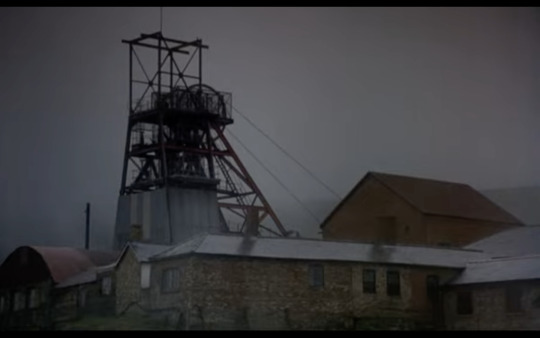
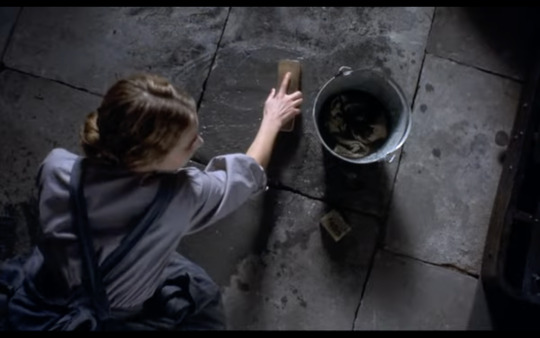
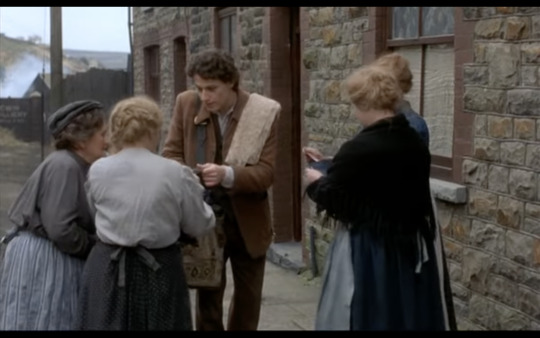

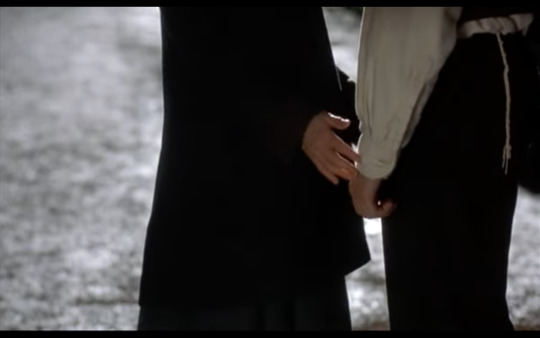
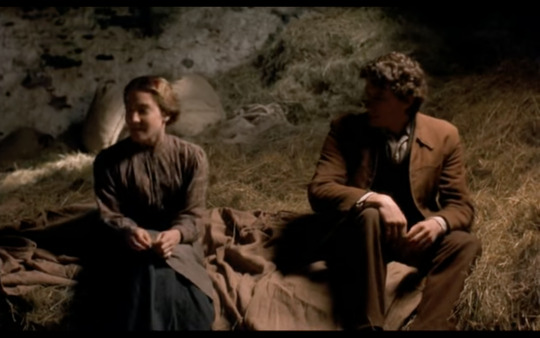
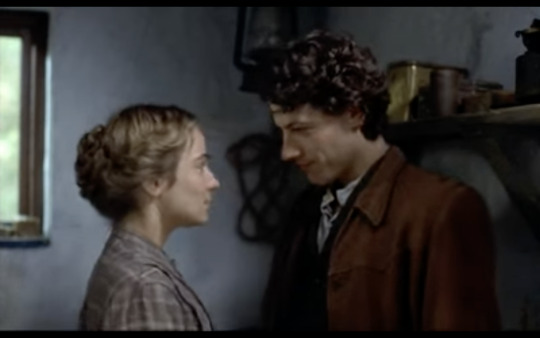

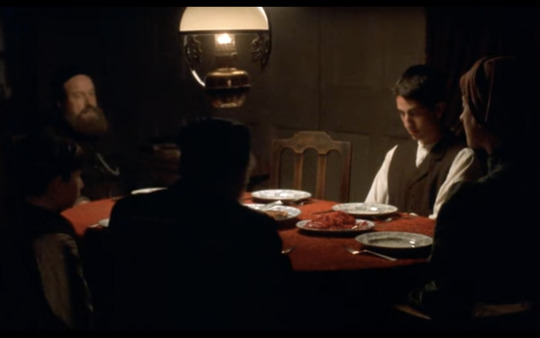

Solomon a Gaenor (1999)
1h40m | Welsh, Yiddish, & English
Y wythnos diwetha', nes i weld y ffilm 'ma. Mae hi'n am Solomon Levinsky, sy'n dod i'r Cymoedd De Cymru o Rwsia efo'i deulu, a Gaenor Rees, sy wedi byw yna ei holl fywyd. Mae Solomon a'i deulu'n Iddewon Uniongred, a mae Gaenor yn dod o deulu Anghydffurfiol, ond mae'r dau'n disgyn mewn cariad. Mae'r stori'n dipyn bach fel Romeo a Juliet, ond mae hi'n wahanol hefyd—mae'r cymeriadau'n mwy cymhleth, yn fy marn i, ac yn y diwedd o'n i ddim yn siwr beth i feddwl amdanyn nhw. Er hynny, mae'r hanes yn ddiddorol iawn, a mae'r ffilm yn sôn am y streiciau yn y Cymoedd ac am hanes Iddewig yng Nghmyru. Mae'r sinematograffi'n wych, ac o'n i'n licio'r trac sain hefyd, ond dwi'n dal i drio penderfynu am y plot. Rhaid i chi'w gweld a deud beth ydach chi'n meddwl!
Last week, I watched this film. It's about Solomon Levinsky, who comes to the South Wales Valleys from Russia with his family, and Gaenor Rees, who's lived there all her life. Solomon and his family are Orthodox Jews, and Gaenor is from a Noncomformist family, but the two fall in love. The story is a bit like Romeo and Juliet, but it's different too—the characters are more complex, in my opinion, and at the end I wasn't sure what to think about them. The history was really interesting, though, and the film talks about the strikes in the Valleys and about Jewish history in Wales. The cinematography is great, and I liked the soundtrack as well, but I'm still trying to decide about the plot. You have to watch it and tell me what you think!
Geirfa - Vocabulary
(Note: The movie is set in South Wales, so some of these are Southern Welsh variants)
swllt - shilling
cefn gwlad - countryside
cenhadwr - missionary
perthyn i - belong to, be related to
pai' bod yn ddwl - don’t be silly
rhywpryd eto - another time
tost - sick
moddion - medicine
damwain - accident
twymo - to heat up
darn - passage
tlawd - poor
cwlwm - knot
siort - type
pobi - to back
carthu - to clean
bod mas o gyrraedd - out of reach of, past
main - fine
cyhuddiad - charge, accusation
dieithryn - outsider
cosb - punishment
disgwyl babi/plentyn - to be expecting a child, to be with child
cywilydd - shame
bradychu - to betray
gwlân - wool
sodli - heel
gweddi - prayer
rheol - rule
haearn - iron
lliain - towel
pyped - puppet
dere ymlaen - come on, let’s go
carchar - prison
cyfeiriad - address
gwau - to knit
Os ti isio gweld y ffilm, mae hi ar Youtube // If you want to watch the movie, it's on Youtube:
Fersiwn Gymraeg (heb isdeitlau/isdeitlau i'r Iddew-Almaeneg yn Gymraeg) / Version in Welsh (no subtitles/subtitles for the Yiddish in Welsh)
Fersiwn Saesneg (y rhan amla' yn Saesneg efo rhannau yn Gymraeg a Iddew-Almaeneg/isdeitlau i'r holl ffilm) / Version in English (mostly English with parts in Welsh and Yiddish/subtitles for the whole film)
#i am *really* still not sure what to think about this movie but i was very pretty and it left me with lots to think about#mae'n ddrwg gen i dwi ddim yn siarad cymraeg ond dwi'n trio :'))) dwi isio gwella y flwyddyn 'ma#the welsh version and the english version were different takes so it's not dubbed which means if you watch both you get slight differences#it's also impossible to find the welsh version hence why i'm sharing it here#anyways interesting movie i'm still trying to decided how i feel about it#welsh:general#welsh:culture#welsh:vocab#welsh:practice#welsh:resources#welsh:reference#general:culture#general:vocab#general:practice#general:resources#general:reference
5 notes
·
View notes
Text
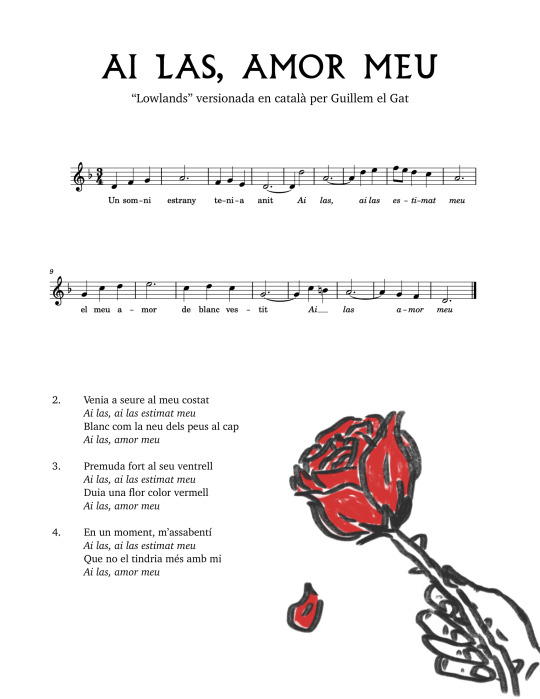
Torno amb una altra traducció d'una cançó tradicional en anglès, aquest cop "Lowlands", també coneguda com "Lowlands Away", que és un capstan shanty o una cançó que es cantava mentre els mariners feien aixecar una àncora o un altre gran pes. Els capstan shanties solen ser molt lents i suaus, ideals per la feina ponderada de fer girar l'argue o cabrestant. Aquesta té nombroses versions, però en general explica la història d'un mariner a qui se li mor la nòvia, i arriba a saber de la seva mort a través d'un "somni estrany", com diu la cançó. Jo ho he invertit, per cap raó a part de la facilitat de fer la lletra, però crec que el sentiment es manté igual. També val a dir que he triat la del cançoner que la meva família té a casa i gràcies al qual vaig arribar a conèixer la cançó en primer lloc, però que té la curiositat de que l'arranjament és en clau menor, tot i que en la gran majoria de les versions és en tonalitat major. Dit això, podeu triar el que us agradi més—la lletra val per a les dues.
I aquí, com amb l'altra, teniu una carpeta amb la imatge de dalt en forma de PDF, l'àudio, i el fitxer de Musescore, per si de cas els voleu!
(Com amb "Brindem pels companys/Here's a Health", cal dir que vinc de l'anglès i això només ha estat un exercici en ampliar i treballar el meu català, així que segurament podria ser millor 😅)
Lletra a sota / Lyrics & English translation below
Lletra original en anglès (Fireside Book of Songs)
I dreamed a dream the other night
Lowlands, lowlands away my John
My love she came all dressed in white
My lowlands away
She came to me by my bedside
Lowlands, lowlands away my John
All dressed in white like some fair bride
My lowlands away
And buried in her bosom fair
Lowlands, lowlands away my John
A red, red rose my love did wear
My lowlands away
She made no sound, no word she said
Lowlands, lowlands away my John
And then I knew my love was dead
My lowlands away
Lletra
Un somni estrany tenia anit
Ai las, ai las estimat meu
El meu amor, de blanc vestit
Ai las, amor meu
Venia a seure al meu costat
Ai las, ai las estimat meu
Blanc com la neu dels peus al cap
Ai las, amor meu
Premuda fort al seu ventrell
Ai las, ai las estimat meu
Duia una flor color vermell
Ai las, amor meu
En un moment, m’assabentí
Ai las, ai las estimat meu
Que no el tindria més amb mi
Ai las, amor meu
English Translation
I had a strange dream last night
Alas, alas my beloved
My love dressed in white
Alas, my love
He came and sat by my side
Alas, alas my beloved
White as snow from feet to head
Alas, my love
Pressed hard to his stomach
Alas, alas my beloved
He carried a flower, red in color
Alas, my love
In a moment, I realized
Alas, alas my beloved
That I wouldn’t have him with me anymore
Alas, my love
#'alas' i 'ai las' són la mateixa paraula etimològicament m'està explotant el cervell 🤯🤯🤯#anyways. espero que us agradi. i que el pony pisador miri això i decideix prendre-ho com un punt de partida per fer-ne una versió oficial <#en tinc alguns també del català a l'anglès que espero poguer penjar aquí algun dia d'aquests.......#i com a objectiu molt llunyà fer un cançoner bilingüe de cançons marineres però ara estem en examens i no tinc temps ni per pensar-ho#recomaneu-me coses si teniu alguna cançó que us faci una especial il·lusió!#i buenu. volia penjar això per octubre o novembre o algo perquè és com una mica ~spooky~ i tal però hem fet com podíem#correccions sempre benvingudíssimes <3#catalan:general#general:music#general:reference#general:translation#catalan:translation#projecte cançons del mar / sea songs#also side note but they uploaded fireside to archive.org 🥹🥹🥹 now everyone can have access to the communist folk songs 🥹🥹🥰
14 notes
·
View notes
Text
It only took me 9 months, but here is a translation!
Per nau, un vaixell de vint canons
For a vessel, a twenty-cannon ship
Per llar, els confins blaus de la mar
For a home, the blue horizons of the sea
Per llei, el vent de tramuntana
For a law, the North Wind*
Vent que engalana
Wind which bedecks
El bergantí, en la foscor
The brigantine in the darkness
Busca una nau per enfonsar
He’s looking for a ship to sink
Busca un vaixell per abordar
He’s looking for a ship to board
Mentre el pirata navega
As the pirate sails
Deixa al darrere
He leaves behind him
Estela de sang i de foc
A wake of blood and fire
Flama de mort
The flame of death
[ TORNADA:
Canta el pirata a coberta
The pirate sings on deck
Canta somnis de llibertat
He sings dreams of freedom
Des de l'Illa de Formentera
From the Island of Formentera
Al nord-est de Mallorca
To the northeast of Mallorca
I dеl cel de Menorca
And from the sky of Menorca
Fins a l'Empordà
To the Empordà**
Solca еl mar a tota vela
He ploughs across the sea at full sail
Fins a l'illa d'Espelmador
From the island of S'Espalmador***
On fa més de cent trenta llunes
Where more than a hundred and thirty moons ago
Entre les roques
Between the rocks
Va enterrar el cofre d'or
He buried his treasure chest of gold ]
Diuen que no sap el que és la por
They say that he doesn’t know what fear is
Diuen que l'han vist jugar amb la mort
They say they’ve seen him play with death
Diuen que la sang l'enamora
They say that he’s in love with blood
I no perdona cap enemic
And he pardons no enemy
Carregat de rom i blat
When they’re loaded with rum and wheat
[ TORNADA ]
El seu tresor
His treasure
* - specifically the Tramontane
** - a region in northeastern Catalonia along the Mediterranean
*** - a small uninhabited island near Formentera
youtube
FLIPANTTTT QUE HAN FET UNA CANÇÓ EN CATALÀ JUNTS
#made this mostly to post on other interweb sites where it is findable for people looking for a translation (lyricstranslate)#so it's perhaps more english-y than could be desired but whatever#usually i assume some level of familiarity with the language (as in like a learner/interested) but i don't think that's the audience here#should have gotten there when it came out and everyone in the comments was asking for a translation ahaha#also whoops i realize that everything i've posted here for the last three months is a song translation. not sorry about it though :’)#catalan:general#general:music#catalan:music#catalan:translation#general:translation#IF YOU SAW ME POST THIS ELSEWHERE NO YOU DIDN'T#I CAN TOTALLY KEEP TRACK OF SIDEBLOGS SHDJFHSKF
25 notes
·
View notes
Text
youtube
This song has kind of become my obsession as of late, and since I'm trying to get better at understanding Galician I thought I'd attempt to do a translation. Corrections welcome! / Aquesta cançó ha esdevingut una obsessió últimament, i com que vull millorar el meu (enteniment del) gallec pensava que potser m'atreviria a traduir-la. Qualsevol correcció és benvinguda!
Se do torreiro da festa
Si en el terreny de festa
If on the dancefloor
Eu fose sempre a primeira
Jo sempre fos la primera
I was always the first
En sacare a bailar aos mociños
En treure a ballar als nois
To invite the boys to dance
Mociñas desta noite mesta
Noies d’aquesta nit espessa
Girls of the thick of night
Se debullase as espigas
Si desgranés les espigues
If I threshed the wheat
Coas uñas longas de gata
Amb ungles llargues de gata
With long acrylic nails
E da horta só apañase as espiñas
I de l’horta només collís les espines
And from the garden I only picked the thorns
E a mala herba que me mata
I la mala herba que em mata
And the weeds that are killing me
[ RETROUSO:
A miña tatara-tatara-tatara-tataravoa estaría contenta
La meva rebesàvia estaria contenta
My great-great-grandmother would be happy
Tatara-tatara-tatara-tataravoa estaría contenta
Rebesàvia estaria contenta
Great-great-grandmother would be happy
Tatatata-tataravoa estaría contenta
Rebesàvia estaria contenta
Great-great-grandmother would be happy
Tatatata se me escoita cantar
Si m’escolta cantar
If she hears me sing ]
Se ao camiño da fonte
Si al camí de la font
If on the way to the spring
Fose a algo máis que a lavare
Hi anés per alguna cosa més que rentar
I went for something besides washing
E na misa dos domingos
I a la missa els diumenges
And at Mass on Sundays
Quedase sempre fóra pra repicare
Quedés sempre a fora per a repicar
I stayed outside to ring the bells
Se nos visen no palco
Si ens veiessin dalt de l’escenari
If they could see us on stage
Coa forza dun vendavale
Amb la força d’un vendaval
With the strength of a powerful wind
Non sei ben se chorarían
No sé si bé plorarien
I don’t know if they’d cry
Ou ben subirían con nos a cantare
O bé pujarien amb nosaltres a cantar
Or if they’d get up to come sing with us
[ RETROUSO ]
Vou ó seu lado, collo a súa man
Vaig al seu costat, agafo la seva mà
I go to her side, I take her hand
Cóntolle to que fixen no serán
Li explico tot el que vaig fer en la festa
I tell her everything I did at the party
Non se alarma, non se asusta
No s’alarma, no s’espanta
She isn’t alarmed, she doesn’t get shocked
Ela viviu mil veráns
Ella va viure mil estius
She lived a thousand summers
[x4]
[ RETROUSO ]
#general:music#general:translation#galician:general#galician:translation#galician:music#catalan:general#catalan:translation#tanxugueiras as fillas de cassandra e mondra holy trinity of galician folktronica girlies <3#literally who is doing it like them#Youtube
8 notes
·
View notes
Text
youtube
I thought this song, a collaboration between Basque band Bulego and Spanish musician Ede, was really pretty, and the words are also very poetic. They switch between Spanish and Basque in very interesting ways, but the whole thing comes together quite well. If you speak Spanish and/or Basque you can watch the process they went through to make the song here, and give a better explanation than I could of what it's about, but roughly it speaks to the fact that even past experiences that we regret make up an important part of who we are now, so as much as we might want to get rid of them we can't.
Si lo hubiera sabido antes
If I had known before
que todo este ruido escondía mi nombre
That all this noise was hiding my name
Isiltasun honen atzean gorde dira
Behind all this silence are being kept
nire izenaren oihartzun guztiak
All the echoes of my name
Quizás escondiendo las manos
Maybe hiding my hands
quizás rebajando la voz
Maybe lowering my voice
quizás resistiendo el impulso
Maybe resisting the impulse
o quizás incluso si no
Or maybe even if not
podría apagar esta culpa
I could turn off this guilt
pero sin todo este dolor
But without all this pain
[ ERREPIKA / ESTRIBILLO:
Ez nintzen ni izango
I wouldn’t be me
Esa no sería yo
That wouldn’t be me
Dudan hutsune honek bete ez banindu.
If the hollowness that I have didn’t fill me
Esa no sería yo
That wouldn’t be me
ez nintzen ni izango
I wouldn’t be me
hoy la culpa deja hueco a la luz
Today guilt leaves a space for the light ]
Lorez apaindu ditut
I’ve embellished with flowers
isiltasun honen erpin guztiak
All the spikes of this silence
En este pecho tan lleno
In this full bosom
ya no cabe el silencio que me pides guardar
There’s no room left for the silence that you asked me to keep
Agian ausartu banintz
Maybe if I had dared to
agian egin banu
Maybe if I had done it
agian ahots horrekin
Maybe with that voice
ezingo nuen lortu
I wouldn’t have been able to
erru hau itzali eta
Turn off this guilt and
min hau berriz ez sentitu
Not feel this pain again
[ERREPIKA / ESTRIBILLO ]
#at some point i want to collect a playlist of songs for your blorbos (all purpose) in not english#and this is a prime candidate for that#also it's just pretty and also hey look i can translate stuff from basque :0#still working on x eta besteak we'll see if i'm up to that challenge#general:music#basque:general#spanish:general#general:translation#basque:translation#spanish:translation#Youtube
6 notes
·
View notes
Text
youtube
Here's another song translation, by Mallorcan band Reïna! Since they're from the Balearic Islands and I don't think I've made a post about that dialect of Catalan I thought this would be an interesting chance to do that as well. But also the song is just really pretty, so I hope you guys enjoy!
Ja m’ha quedat clar que ara vols ser tu es dolent
It’s become clear to me that now you want to be the bad guy
I que m’escoltes per a no estar tot sol amb es teus pensaments
And that you listen to me not to be all alone with your thoughts
I que tots es camins que no fèiem encara hi són
And that all the roads we never took are still there
Tot i que ara semblin més llargs i torts
Even though now they seem longer and more twisted
Ja m’ha quedat clar que no tenc clar si t’entenc
It’s become clear to me that I’m not clear if I understand you
I que te m’acostes per no estar tot sol en es mals moments
And that you get close to me not to be all alone in the worst moments
I que tot es temps que teníem s’ha fos
And that all the time we had has melted
Entre es dits que ara semblen més llargs i torts
Between fingers that now seem longer and more twisted
[ TORNADA:
Ets tan dolç que per dins me mata
You’re so sweet that it kills me inside
Te tenc tan a prop que sempre m’enrampes
I hold you so close that you always give me a shock
És tan fort que ja no té importància
It’s so much that it doesn’t matter anymore
Ets tan dolent que m’arriba a fer gràcia
You’re so bad that it’s become funny to me ]
Ja m’ha quedat clar que ara ets tu es dolent
It’s become clear to me that now you’re the bad guy
I que m’enyores només quan saps que ho has fet malament
And that you only miss me when you know you’ve done a bad job
I maldament mos enteníem, ara ja no
And even though we used to understand each other, we don’t now
I d'ençà es dies crec que tornen més llargs i tot
And from hereon out I think the days are becoming longer and all
[ TORNADA ]
Here are some features of Balearic/Mallorcan Catalan which you can hear in the song:
l'article salat - instead of el/la/els/les it's es/sa/es/ses
different distributions/realization of the neutral vowels - /ə/ can also be pronounced in stressed syllables (generally where you would have /ε/ in Central Catalan) and there's similar vowel reduction to Valencian of /ɔ/ and /o/ to /o/ rather than /u/
Using the pronomial clitics me/te/etc. which in Central Catalan usually only come after the verb before verbs instead of the forms em/et/etc. - also note mos (= ens/nos) which also occurs in lots of other dialects of Catalan
importància and gràcia are pronounced importanci and graci (this is common with a lot of words ending in -cia)
tenc = tinc
maldament = encara que
Bonus: Pronouncing /k/ as palatal /c/ - this is much less common, but the lead singer of Reïna does it which I thought was interesting (in contrast to Maria Jaume who doesn't seem to)
#let me know if i missed any i'm much less familiar with mallorcan catalan than i am with valencian and central catalan :')#i just like this song it's very sweet sounding and the lyrics go kind of hard#catalan:general#general:music#catalan:music#general:translation#catalan:translation#catalan:linguistics#catalan:pronunciation#idk man i don't have a dialectology tag so i'm not sure how to file this#coses de la terra#catalan#(comentari al marge la maria jaume s'assembla molt a una noia que crec que era la meva primera crush shdfjhsfkh)#Youtube
15 notes
·
View notes
Text

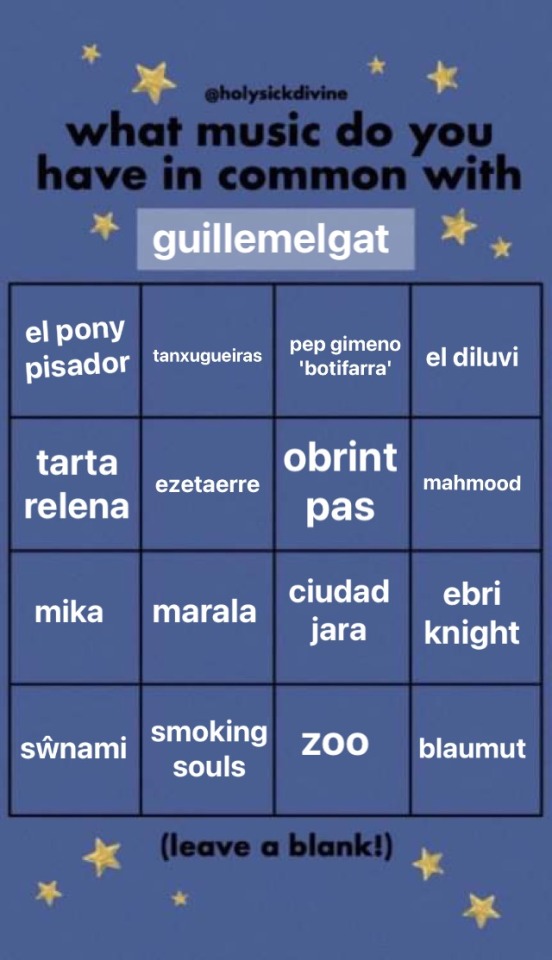

Got tagged by @minglana to post the music we have in common, we got bingo! :D
I'll tag @no-passaran, @chatwiththeclouds, @kutyozh, @gwendolynlerman, @girlmaturin, and anyone who sees this list of artists and is excited about it lol
#did not mean to repeat mika whoops#i feel like half of yours are artists who i really want to start actually listening to so i will consider it a to do list#i'm literally doing a presentation on catalan rap/urban music on monday and i think i'm going to use a mushkaa song :')#but yeah definitely need to listen to tribade au d'astí la ronda de boltaña etc#thank you for the tag!#parlem de tonteries#general:music
8 notes
·
View notes
Text
I'm sharing this song by Tarta Relena which is an adaptation of Pashtun women's improvised poetry published in the book Songs of Love and War, compiled by Afghan poet Sayd Bahodine Majruh and translated into Catalan as El suïcidi i el cant by Margarida Castells Criballès. Tarta Relena are a band of two young women who adapt lots of interesting texts and pieces of music from all sorts of eras and places into stripped-down electronic and vocal works with incredible harmonies and sonorities. I think this song has a lot of really interesting things going on, and the lyrics are very intense but very beautiful.
M’arrenquin amb un ganivet totes les pigues
Let them tear out all of my freckles with a knife
si nego que et desitjo, si amagues que m’estimes.
If I deny that I love you, if you hide that you love me
Benamat, vine a la vora i seu amb mi una estona,
Beloved, come to my side and sit with me a while
que la vida aviat serà tal com l’hivern que s’escola.
Because life will soon be like the winter that trickles away
L’espai entre nosaltres que ens separa l’un de l’altra
The space between us that separates the one of us from the other
em nega com l’onada quan s’empassa les barques.
Drowns me like the wave when it swallows ships
Ai, agafa’m, ai, abraça’m, ai, tingue’m a la vora,
Oh, take me, oh, embrace me, oh, have me by your side
que aquesta pena meva se m’emporta i deixa sola.
This pain of mine is taking me over and leaving me alone
La meva boca és teva, pots devorar-la sens por,
My mouth is yours, you can devour it without fear
però deixa’m la llengua lliure per anar-te parlant d’amor.
But leave my tongue free to keep speaking to you of love
El jardí del món creares, oh déu meu, i no és pecat
You created the garden of the world, oh god, and it’s not a sin
que n’hagi pres la flor que a mi més m’ha agradat.
That I’ve picked the flower which I like best
Amor meu, jura una cosa, jura que vindràs amb mi,
My love, swear me something, swear that you’ll come with me
que pugui jo sembrar-te totes les flors del camí.
So that I can sow all the flowers on your path
Quan passo prop de la tomba d’un sant
When I pass close to the tomb of a saint
li tiro pedres pels desitjos que em va negant.
I throw stones at them for the desires they deny me
I si era veritat que tu no em sabies estimar,
And if it was true that you didn’t know how to love me
digue’m per què despertes el meu cor endormiscat?
Tell me why you awake my sleeping heart?
Ves-te’n lluny, amic meu, bon viatge i bon vent,
Get yourself far from me, my friend, goodbye and good riddance
dels amants n’eres un més, i ara me’n trobaré cent!
As a lover, you’re just one more, and now I’ll find myself a hundred
M’he repintat les pigues i avui nit em crema el ventre.
I’ve repainted my freckles and tonight my insides are burning
Si ara em veiessis, perdries la raó per sempre.
If you saw me now, you’d lose your mind forever
Demà els que tinguin gana deixaré ben satisfets
Tomorrow anyone who wants it I’ll leave well satisfied
travessaré la vil·la amb els cabells al vent.
I’ll cross the village with my hair blowing in the wind
#mildly obsessed with singing this song around the house like a normal person#also playing around with gender stuff with it because i feel like if you change the gender of the speaker or the lover#that creates very interesting dynamics not present in the original#either way it's an incredible song#they have lots of other very cool stuff i would recommend checking them out!#also i got to see them live which is crazy because catalan bands never come to the us#but they did a tour last year and hopeful will do more in years to come!#general:music#catalan:music#catalan:general#general:translation#catalan:translation#Bandcamp
19 notes
·
View notes
Text

FOLKTRONICA IBERICA - A Playlist
Hello everyone, @minglana and I have been working on trying to compile a playlist of all the incredible folktronica-adjacent music coming out the Iberian Peninsula in the past couple of years, and it's finally here and ready for your listening pleasure! Including everything from electro-fado and trance-like muiñeiras to arrangements of 14th century liturgical chants and revamped jotas, and spanning from the Atlantic to the Mediterranean, the playlist is roughly ordered by geographical location, starting in Portugal and moving up across the north from Galicia and Asturias through the Basque Country to Aragon and the Catalan Countries, then south to Andalusia and Extremadura. Languages include Portuguese, Galician, Asturian, Basque, Aragonese, Catalan, and Spanish. If there's any artists or song you'd like to see included, let us know and we'll add them!
#mil gràcies z per les recomanacions increïbles i també per la paciència <3#no diré quant he trigat en publicar això però ja ho podeu esbrinar crec 😅#if any of you have any further questions about the artists featured we'd be happy to answer them! or what's going on in the songs etc#there's so so much good stuff coming out now and it deserves to be celebrated and spread as far as possible#and honestly i'd love more recommendations so anyone else you guys know about would be much appreciated <3#also yow i have not posted in a while will need to think about how to fix that 😬#for now enjoy this!#general:music#catalan:music#basque:music#spanish:music#portuguese:music#galician:music#aragonese:music#general:reference#asturian:music#music#folktronica#portugal#spain#galicia#asturies#catalunya#illes balears#país valencià#euskal herria#andalucía#aragón#<- so people who are not in this corner of tumblr will maybe find this#not sure don't really know how to tag my posts so they're findable so we'll see if anything works
42 notes
·
View notes
Text
youtube
FLIPANTTTT QUE HAN FET UNA CANÇÓ EN CATALÀ JUNTS
#*incohesive noises*#ho sento però l'amistat pony pisador/longest johns ha fet més per visibilitzar el català que qualsevol acte de l'irl i ho dic amb amor <3#ho pronuncien fatal però m'és igual <3 que aquest video arribi a més visualitzacions que fucking money man sisplau <33#potser faré una traducció algun dia d'aquests però ara per ara he de mantenir el meu lloc com a fan número ú del pony a tumblr punt cat#catalan:general#general:music#catalan:music#parlem de tonteries#coses de la terra#Youtube
25 notes
·
View notes
Text
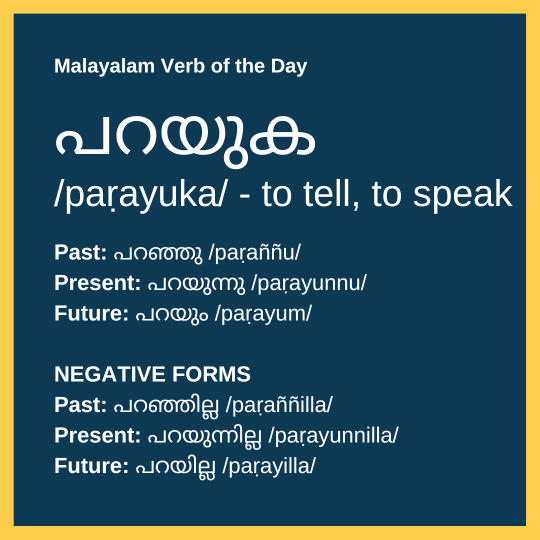
Malayalam Verb of the Day: പറയുക /paṛayuka/ - to tell, to speak
Past: പറഞ്ഞു /paṛaññu/
Present: പറയുന്നു /paṛayunnu/
Future: പറയും /paṛayum/
NEGATIVE FORMS
Past: പറഞ്ഞില്ല /paṛaññilla/
Present: പറയുന്നില്ല /paṛayunnilla/
Future: പറയില്ല /paṛayilla/
#malayalam verb of the day#malayalam:general#malayalam:vocab#malayalam:grammar#malayalam:ref#general:vocab#general:grammar#general:ref
5 notes
·
View notes
Text
youtube
Comparteixo aquesta cançó en asturià per al 8M, és una reivindicació de la lluita feminista i tota la feina que cal fer per arribar a una situació d'igualtat entre homes i dones. No he trobat la lletra, si no la posaria aquí, però crec que s'enten, i fins i tot si no la pots entendre el missatge es transmet també amb la música que és un veritable himne!
#molt fan d'aquest grup algú les va recomanar en un post d'un mutual fa poc i aquesta cançó i llume les he tingut en bucle des d'ençà#general:music#Youtube
6 notes
·
View notes
Text

Malayalam Verb of the Day: ചെയ്യുക /ceyyuka/ - to do
Past: ചെയ്തു /ceytu/
Present: ചെയ്യുന്നു /ceyyunnu/
Future: ചെയ്യും /ceyyum/
NEGATIVE FORMS
Past: ചെയ്തില്ല /ceytilla/
Present: ചെയ്യുന്നില്ല /ceyyunnilla/
Future: ചെയ്യില്ല /ceyyilla/
#malayalam verb of the day#malayalam:general#malayalam:vocab#malayalam:grammar#malayalam:ref#general:vocab#general:grammar#general:ref
21 notes
·
View notes
Text
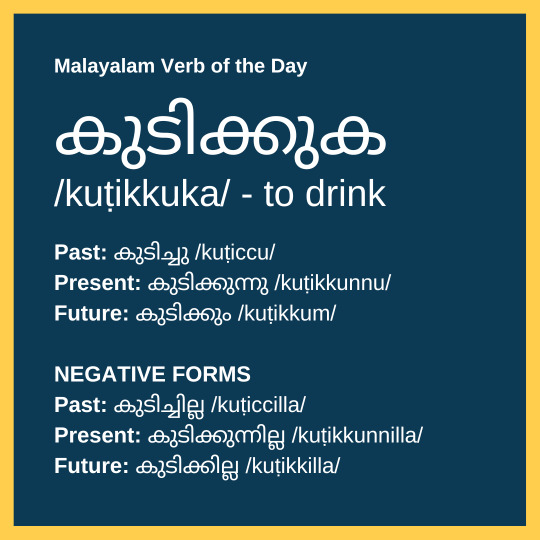
Malayalam Verb of the Day: കുടിക്കുക /kuṭikkuka/ - to drink
Past: കുടിച്ചു /kuṭiccu/
Present: കുടിക്കുന്നു /kuṭikkunnu/
Future: കുടിക്കും /kuṭikkum/
NEGATIVE FORMS
Past: കുടിച്ചില്ല /kuṭiccilla/
Present: കുടിക്കുന്നില്ല /kuṭikkunnilla/
Future: കുടിക്കില്ല /kuṭikkilla/
#malayalam verb of the day#malayalam:general#malayalam:vocab#malayalam:grammar#malayalam:ref#general:vocab#general:grammar#general:ref#i am a fool the mistake is corrected now though
5 notes
·
View notes